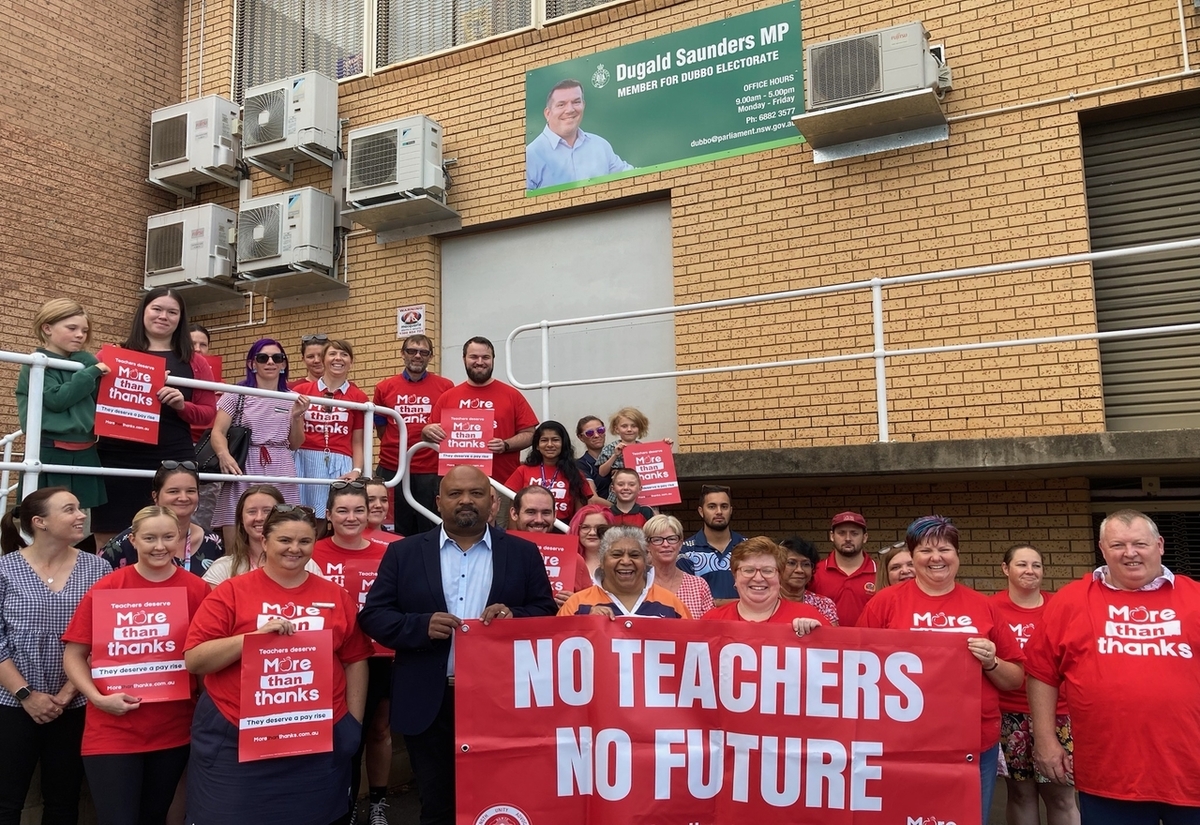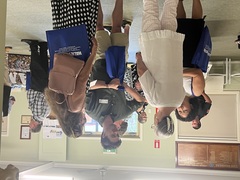Teachers put their foot down for Dugald
Laura Williams
09 March 2022, 6:19 AM
 Members of the NSW Teachers Federation gathered at the office of Dugald Saunders this morning, while the Federation’s Deputy President Henry Rajendra met with him to rally support for teaching conditions.
Members of the NSW Teachers Federation gathered at the office of Dugald Saunders this morning, while the Federation’s Deputy President Henry Rajendra met with him to rally support for teaching conditions. Members from the NSW Teachers Federation assembled in Dubbo this morning (Wednesday 9 March) with local Member for Dubbo and Minister for Western NSW Dugald Saunders in a final plea to garner support for the union’s efforts to improve teacher pay and workload conditions.
The meeting follows months of endless pursuit for change from teacher unions, including a statewide industrial strike last year that closed almost 400 schools for 24 hours.
NSW Teachers Federation Dubbo organiser Tim Danaher said this morning's meeting in Dubbo came out of necessity to protect the schools further west.
“Dubbo is a hub, and if we can’t attract teachers to Dubbo you can imagine how that impacts vacancies being filled in our more isolated and rural communities. So the ball is in the government’s court,” Mr Danaher said.
At the time of publication, there were 26 vacant teaching roles available in the public schooling system across the Western Plains just this week. According to Mr Danaher, in 2021 to Term 4, there were 64.79 unfilled teacher vacancies across the Central West region of NSW.
While the meeting didn’t produce any definitive results for the union, Mr Danaher said that it was crucial to make themselves heard.
“It’s probably a little bit early to say but Dugald is definitely aware of what is happening. In Dubbo in the last few weeks we’ve had 50 classes collapse due to staff shortages. That’s horrendous and should be addressed,” he said.
To counter it, the NSW Teachers Federation has made the two demands that have remained the same throughout their battle; to address the workload that’s facing teachers, and pay them a competitive salary for what they do.
NSW Teachers Federation Deputy President Henry Rajendra also made an appearance at the meeting this morning.
“That the Government is pursuing a new Award that seeks to impose a 2.04 per cent salary cap with no change to the crippling working conditions experienced by the profession for a three-year period is contemptuous," Mr Rajendra said.
“At a time when inflation is running at 3.5 per cent and predicted to grow, this would constitute a cut to teachers’ real income and status of the profession,” he said.
Despite the interruptions of the industrial action last year, little change has been made to either, leading teachers to become increasingly frustrated at the ongoing situation.
“(The government) has to listen to the profession. If they do value public education - which they should because we have a massive amount of students in our public system - and want to improve results, then first and foremost we need to see teachers come to the profession,” Mr Danaher said.
“The data is showing that they’re not coming into the profession for two main reasons, so if they address that uncompetitive wage and the unsustainable workload, things will change, but they need to invest.”
The Federation has given the government a month to consider their requests, after which they will be forced back to the drawing board, back to negotiations, and potentially back to industrial action.
“Unless the Government demonstrates that it is serious in providing improvements in working conditions and salary justice by mid-March, then the Federation will consider the full suite of options available to it, including the recommencement of industrial action," Mr Rajendra said.
In rural areas like the Western Plains, filling vacancies relies heavily on employment incentives and higher salaries to draw teachers to more remote areas. Mr Danaher said that with the increasing workload, incentives haven’t been able to solve the issue.
“Whilst it is an incentive for some, the real issue is the workload and other issues associated with that as well, such as the housing provisions in those rural and remote areas.”
“Those incentives are certainly welcome but there does need to be a review because we have certain schools that cannot attract teachers,” he said.
The NSW Teachers Federation will meet again on Saturday 19 March to assess the outcome of negotiations and determine a further course of action.




